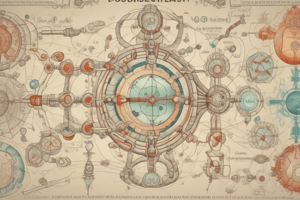Podcast
Questions and Answers
Which of the following hormones is classified as a steroid hormone?
Which of the following hormones is classified as a steroid hormone?
- Thyroxine
- Dopamine
- Cortisol (correct)
- Insulin
What is the primary transport method for lipid soluble hormones in the bloodstream?
What is the primary transport method for lipid soluble hormones in the bloodstream?
- Circulating in free form
- Attached to lipoproteins only
- Bound to blood transport proteins (correct)
- Within red blood cells
How do lipid soluble hormones exert their effects on target cells?
How do lipid soluble hormones exert their effects on target cells?
- By binding to receptors on the cell surface
- By diffusing through the membrane and binding to nuclear receptors (correct)
- By activating G proteins in the cytoplasm
- By recruiting peptide hormones
Which of the following is NOT a peptide/protein hormone?
Which of the following is NOT a peptide/protein hormone?
What type of hormones include adrenaline and noradrenaline?
What type of hormones include adrenaline and noradrenaline?
Which of the following statements about thyroid hormones is true?
Which of the following statements about thyroid hormones is true?
What is the function of G proteins in water soluble hormones?
What is the function of G proteins in water soluble hormones?
Which of the following hormone classifications includes glucagon?
Which of the following hormone classifications includes glucagon?
Which definition best describes a hormone?
Which definition best describes a hormone?
What is the primary function of tropic hormones?
What is the primary function of tropic hormones?
Which of the following accurately describes paracrine signaling?
Which of the following accurately describes paracrine signaling?
Which gland is NOT considered an endocrine organ?
Which gland is NOT considered an endocrine organ?
What best describes autocrine signaling?
What best describes autocrine signaling?
Which mechanism is NOT involved in hormone regulation?
Which mechanism is NOT involved in hormone regulation?
Which of these is a key characteristic of endocrine glands?
Which of these is a key characteristic of endocrine glands?
What is the primary difference between primary and secondary endocrine dysfunction?
What is the primary difference between primary and secondary endocrine dysfunction?
Which hormone is classified as a peptide/protein hormone?
Which hormone is classified as a peptide/protein hormone?
What describes the nature of steroid hormones?
What describes the nature of steroid hormones?
What is the primary method by which water soluble hormones circulate in the bloodstream?
What is the primary method by which water soluble hormones circulate in the bloodstream?
How do water soluble hormones exert their effects on target cells?
How do water soluble hormones exert their effects on target cells?
Which of the following is NOT a characteristic of thyroid hormones?
Which of the following is NOT a characteristic of thyroid hormones?
What is the role of G proteins in hormone signaling?
What is the role of G proteins in hormone signaling?
Which statement accurately distinguishes the classification of hormones?
Which statement accurately distinguishes the classification of hormones?
Which molecule serves as the precursor for steroid hormones?
Which molecule serves as the precursor for steroid hormones?
What is the main function of endocrine glands?
What is the main function of endocrine glands?
Which term describes substances secreted by a cell that affect only adjacent cells?
Which term describes substances secreted by a cell that affect only adjacent cells?
Which of the following glands is considered an endocrine organ?
Which of the following glands is considered an endocrine organ?
What is the role of tropic hormones?
What is the role of tropic hormones?
Which of the following best defines the term 'hormone'?
Which of the following best defines the term 'hormone'?
What characterizes autocrine signaling?
What characterizes autocrine signaling?
What system primarily detects blood concentrations for hormone regulation?
What system primarily detects blood concentrations for hormone regulation?
Which type of hormone acts through nervous stimulation?
Which type of hormone acts through nervous stimulation?
Hormones are molecules released in one part of the body that affect activity of cells in other parts of the body.
Hormones are molecules released in one part of the body that affect activity of cells in other parts of the body.
Exocrine glands secrete hormones directly into the bloodstream.
Exocrine glands secrete hormones directly into the bloodstream.
Tropic hormones are those that affect the activity of other endocrine glands.
Tropic hormones are those that affect the activity of other endocrine glands.
Autocrine signaling refers to substances secreted by a cell that affect only adjacent cells.
Autocrine signaling refers to substances secreted by a cell that affect only adjacent cells.
Endocrine glands produce and secrete hormones into the bloodstream.
Endocrine glands produce and secrete hormones into the bloodstream.
Paracrine substances affect cells located farther away from the secreting cell.
Paracrine substances affect cells located farther away from the secreting cell.
One method of hormone regulation is through nervous stimulation, which involves electrical signals.
One method of hormone regulation is through nervous stimulation, which involves electrical signals.
Primary endocrine dysfunction occurs when an endocrine gland is targeted and dysfunctional.
Primary endocrine dysfunction occurs when an endocrine gland is targeted and dysfunctional.
Steroid hormones are derived from cholesterol.
Steroid hormones are derived from cholesterol.
Water soluble hormones bind to receptors inside the cell.
Water soluble hormones bind to receptors inside the cell.
Peptide hormones circulate in the blood in free form.
Peptide hormones circulate in the blood in free form.
Thyroid hormones behave the same as steroid hormones.
Thyroid hormones behave the same as steroid hormones.
Amine hormones include dopamine and serotonin.
Amine hormones include dopamine and serotonin.
Lipid soluble hormones circulate freely in the bloodstream.
Lipid soluble hormones circulate freely in the bloodstream.
Cortisol is considered an amine hormone.
Cortisol is considered an amine hormone.
Growth hormone is classified as a peptide hormone.
Growth hormone is classified as a peptide hormone.
Flashcards are hidden until you start studying
Study Notes
Hormone Classification
- 4 Molecular Classes
- Amine hormones: Derived from amino acids,
- Catecholamines (e.g., dopamine, noradrenaline)
- Serotonin
- Steroid hormones: Derived from cholesterol
- Cortisol, Testosterone, Oestrogen, Progesterone, Aldosterone, Vitamin D
- Peptide/protein hormones: Chains of amino acids
- ADH, Growth hormone, Insulin
- Thyroid hormones: Technically peptides but behave differently
- Triiodothyronine (T3), Thyroxine (T4)
- Amine hormones: Derived from amino acids,
Hormone Solubility Classification
- Lipid-Soluble:
- Steroid hormones (e.g., aldosterone, cortisol, oestrogen),
- Thyroid hormones
- Water-Soluble:
- Amine hormones (e.g., dopamine)
- Peptide and protein hormones (e.g., glucagon, insulin)
Hormone Transport
- Lipid-soluble hormones: Circulate in the blood bound to transport proteins (synthesized by the liver, e.g., lipoproteins)
- Water-soluble hormones: Dissolve in blood plasma and circulate in free form
Hormone Signaling
-
Lipid-soluble hormones:
- Diffuse through the cell membrane
- Bind to receptors in the cytosol or nucleus
- Alter gene expression and protein synthesis
-
Water-soluble hormones:
- Bind to cell surface receptors (usually G protein)
- Activate G protein
- Activate proteins in the cytoplasm to alter cell activity
Endocrinology
- Endocrinology: The study of hormones, their functions, and the endocrine system.
- Hormone: A molecule released in one part of the body, impacting cell activity in another part.
- Endocrine gland: Produces and secretes hormones into the bloodstream, potentially affecting distant targets.
- Exocrine gland: Secretes products into ducts that open onto an epithelium.
Endocrine System: Key Definitions
- Tropic hormone: A hormone that influences another endocrine gland.
- Autocrine: A substance released by a cell that affects the same cell.
- Paracrine: A substance released by a cell that affects only adjacent cells.
- Endocrine: Glands release hormones into the bloodstream to reach target cells.
Main Endocrine Organs
- Hypothalamus
- Pituitary gland
- Parathyroid glands
- Thyroid gland
- Adrenal gland
- Ovaries/testes
- Pancreas
Communication in The Endocrine System
- Three ways hormones can activate:
- Detecting blood levels of specific substances (e.g., glucose, calcium)
- Responding to the blood concentration of another hormone
- Nervous stimulation (electrical signal)
Endocrine Dysfunction
- Primary endocrine dysfunction: Issue within the endocrine gland itself (e.g., thyroid gland not producing enough thyroid hormone)
- Secondary endocrine dysfunction: Issue outside the gland affecting its function (e.g., pituitary gland not secreting enough of a hormone that stimulates thyroid hormone production)
Hormone Classifications
- Four Molecular Classifications: Amine, Steroid, Peptide/Protein, Thyroid
- Amine Hormones: Derived from amino acids
- Catecholamines: Dopamine, noradrenaline
- Serotonin
- Steroid Hormones: Derived from cholesterol
- Cortisol, Testosterone, Oestrogen, Progesterone, Aldosterone, Vitamin D
- Peptide/protein hormones: Chains of amino acids
- ADH, growth hormone, insulin
- Thyroid Hormones: Technically peptides, but behave differently
- Triiodothyronine (T3), Thyroxine (T4)
Solubility and Transport
- Lipid Soluble Hormones:
- Steroid hormones (e.g., aldosterone, cortisol, oestrogen)
- Thyroid hormones
- Circulate bound to transport proteins (synthesized by liver)
- Water Soluble Hormones:
- Amine hormones (e.g., dopamine)
- Peptide and protein hormones (e.g., glucagon, insulin)
- Dissolve in blood plasma and circulate in free form
Hormone Signaling
- Lipid Soluble Hormones:
- Diffuse through the phospholipid bilayer (cell membrane)
- Bind to receptors in the cytosol or nucleus
- Alter gene expression and protein synthesis
- Water Soluble Hormones:
- Bind to receptors on the cell surface (usually G protein)
- Activate G protein
- Activate proteins in the cytoplasm to alter cell activity
Feedback Loops in Endocrinology
- Feedback Loops: Regulate hormone production and release
- Negative feedback: A product inhibits its own production (e.g., thyroid hormone production regulated by TSH, parathyroid hormone)
- Positive feedback: A product stimulates its own production (e.g., oxytocin release during childbirth)
Key Definitions
- Hormone: A molecule released in one part of the body affecting the activity of cells in other parts of the body.
- Endocrine gland: Produces and secretes hormones directly into the bloodstream to target distant cells.
- Tropic hormone: A hormone that affects another endocrine gland.
- Exocrine gland: Secretes products into ducts opening onto an epithelium.
- Autocrine: A substance secreted by a cell that affects the same cell.
- Paracrine: A substance secreted by a cell that affects only adjacent cells.
- Endocrine: Glands that produce and secrete hormones directly into the bloodstream.
Main Endocrine Organs
- Hypothalamus
- Pituitary gland
- Parathyroid glands
- Thyroid gland
- Adrenal gland
- Ovaries/testes
- Pancreas
Ways to Regulate Hormone Secretion:
- Concentrations of Substances in Blood: E.g., blood glucose levels regulate insulin release.
- Nervous Stimulation: E.g., fight-or-flight response triggers adrenaline release from the adrenal glands.
Hormone Molecular Classifications
- Amine Hormones
- Catecholamines
- Dopamine
- Noradrenaline
- Serotonin
- Catecholamines
- Steroid Hormones
- Derived from cholesterol
- Examples:
- Cortisol
- Testosterone
- Oestrogen
- Progesterone
- Aldosterone
- Vitamin D
- Peptide/Protein Hormones
- Examples:
- ADH (Antidiuretic hormone)
- Growth Hormone
- Insulin
- Examples:
- Thyroid Hormones (technically a peptide, but behave differently)
- Triiodothyronine (T3)
- Thyroxine (T4)
Hormone Solubility
- Lipid soluble
- Examples:
- Steroid hormones
- Thyroid hormones
- Examples:
- Water soluble
- Examples:
- Amine hormones
- Peptide and protein hormones
- Examples:
Hormone Transport
- Lipid soluble
- Circulate bound to transport proteins (lipoproteins) synthesized by the liver
- Water soluble
- Dissolve in blood plasma
- Circulate in free form
Hormone Signalling Mechanisms
- Lipid soluble
- Intracellular!
- Mechanism:
- Diffuse through phospholipid bilayer (cell membrane)
- Bind to receptors in cytosol or nucleus
- Alter gene expression and protein synthesis
- Water soluble
- Extracellular!
- Mechanism:
- Bind to receptors on cell surface (usually G protein)
- Activate G protein
- Activate proteins in cytoplasm to alter cell activity.
Hormonal Regulation
- Types
- Negative Feedback:
- Reduces stimulus
- Positive Feedback:
- Increases stimulus
- Negative Feedback:
- Mechanisms for Regulation
- Through detecting hormone concentration in the blood
- Through detecting concentration of other substances (e.g., glucose) in the blood
- Through nervous stimulation (electrical signal)
Key Endocrinology Terms
- Hormone: Molecule released by an endocrine gland that travels through the bloodstream to target cells in other parts of the body.
- Endocrine gland: Produces and secretes hormones directly into the bloodstream to act on distant targets.
- Exocrine gland: Secretes products into ducts which open onto an epithelium.
- Tropic hormone: Hormone that affects another endocrine gland.
- Autocrine: Substance secreted by a cell that affects the same cell's surface receptors.
- Paracrine: Substance secreted by a cell that affects only adjacent cells.
- Endocrine: Glands produce and secrete hormones directly into the bloodstream, acting on distant targets.
Main Endocrine Organs
- Hypothalamus
- Pituitary gland
- Parathyroid glands
- Thyroid gland
- Adrenal gland
- Ovaries/Testes
- Pancreas
Studying That Suits You
Use AI to generate personalized quizzes and flashcards to suit your learning preferences.




